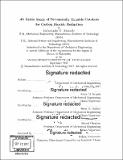| dc.contributor.advisor | Alexie M. Kolpak, Betar M. Gallant, and Ahmed Ghoniem. | en_US |
| dc.contributor.author | Alawode, Babatunde | en_US |
| dc.contributor.other | Massachusetts Institute of Technology. Department of Mechanical Engineering. | en_US |
| dc.date.accessioned | 2018-02-16T20:04:50Z | |
| dc.date.available | 2018-02-16T20:04:50Z | |
| dc.date.copyright | 2017 | en_US |
| dc.date.issued | 2017 | en_US |
| dc.identifier.uri | http://hdl.handle.net/1721.1/113763 | |
| dc.description | Thesis: Ph. D., Massachusetts Institute of Technology, Department of Mechanical Engineering, 2017. | en_US |
| dc.description | Cataloged from PDF version of thesis. | en_US |
| dc.description | Includes bibliographical references (pages 151-164). | en_US |
| dc.description.abstract | Catalytic conversion of CO₂into useful chemicals is an attractive alternative to expensive physical carbon sequestration methods. However, this approach is challenging because current chemical conversion methods employ high temperatures or pressures, thereby increasing cost and potentially leading to net carbon positive processes. Our work presents a novel materials system for dynamic modification of catalytic behavior via polarization reversal in a ferroelectric substrate (i.e tunable catalysis) in order to reduce the energy required for these reactions. Dynamically Tunable Catalysis (catalysis enhanced by real-time changes in the surface chemistry of the catalyst) has been gaining ground recently as a way to go beyond the limits of Sabatier's principle. However, it is not clear whether the catalytic activities of proposed schemes are really better than simply finding a good material close to the top of the volcano in a static catalysis scheme. In this thesis, we study the tunable catalysis scheme of ZnO supported on a ferroelectric. We demonstrate that the physics and chemistry at the surface of the ZnO film can be tuned via the polarization direction of the PbTiO 3 substrate and the thickness of the ZnO. Using Density Functional Theory (DFT), we evaluate the effect of the number of layers and ZnO film orientation on the film's surface chemistry. By characterizing the adsorption and reduction of CO₂ on the different surfaces, we show that a tunable catalysis scheme can significantly increase the rate of CO₂ reduction by several orders of magnitude with less energy cost than simply increasing reaction temperatures and pressures. In addition, we develop a scheme to induce ferroelectricity in ZnO films. If proven in the lab, this will be the first scheme to induce ferroelectricity in ZnO without relying on the involvement of dipole-inducing dopants. In addition, we show that this scheme allows for consistent surface chemistry in tunable catalysis which is important for practical applications. Finally, for the first time, we develop an approach to screen for new tunable catalyst candidates that can potentially be applied to oxides. Our work opens new doors for the catalysis of CO₂ reactions. This work provides a quantitative indication of the promise of tunable catalysts and also their limitations. It thus represents an important contribution to both interface physics and surface catalysis. | en_US |
| dc.description.statementofresponsibility | by Babatunde O. Alawode. | en_US |
| dc.format.extent | 164 pages | en_US |
| dc.language.iso | eng | en_US |
| dc.publisher | Massachusetts Institute of Technology | en_US |
| dc.rights | MIT theses are protected by copyright. They may be viewed, downloaded, or printed from this source but further reproduction or distribution in any format is prohibited without written permission. | en_US |
| dc.rights.uri | http://dspace.mit.edu/handle/1721.1/7582 | en_US |
| dc.subject | Mechanical Engineering. | en_US |
| dc.title | Ab Initio study of dynamically tunable catalysis for carbon dioxide reduction | en_US |
| dc.type | Thesis | en_US |
| dc.description.degree | Ph. D. | en_US |
| dc.contributor.department | Massachusetts Institute of Technology. Department of Mechanical Engineering | |
| dc.identifier.oclc | 1022269013 | en_US |
